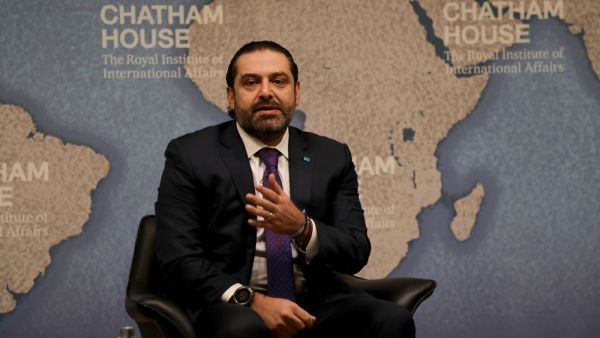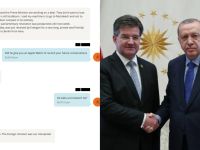The Cabinet formation process, already stalled by a disagreement between President Michel Aoun and Prime Minister-designate Saad Hariri over the shape and makeup of the next government, suffered a new setback over the weekend, destroying any chance of breaking the weekslong deadlock anytime soon.
The Free Patriotic Movement headed by MP Gebran Bassil and Hariri’s Future Movement traded barbs over responsibility for hindering the formation of a new Cabinet urgently needed to enact reforms in order to rescue the country’s struggling economy and rebuild Beirut following the massive Aug. 4 explosion that pulverized Beirut Port.
The FPM’s sudden blistering diatribe against Hariri, which came as Maronite Patriarch Beshara al-Rai was mediating in the dispute between Aoun and Hariri over the Cabinet formation, was also perceived as indirectly targeting the patriarch for rejecting a veto power – a key demand of the FPM – to any party and also for calling for the formation of a government made up of nonpartisan specialists to deliver reforms and reconstruct Beirut.
#Breaking:
— The National (@TheNationalNews) October 22, 2020
Lebanon's President Michel Aoun designates Saad Hariri as the country's new prime minister https://t.co/zNpSBdBLFH pic.twitter.com/jDZWsJJjhr
“Patriarch Rai’s stance on a solution for the Cabinet crisis is similar to that of Hariri. The patriarch’s position has apparently annoyed the FPM leader,” a political source familiar with the matter told The Daily Star Sunday.
The FPM-Future escalation came less than a week after Aoun and Hariri engaged in an unprecedented “war of words,” airing their differences over the makeup of the new Cabinet, with each blaming the other for the delay, further complicating the government formation process.
With the formation efforts hitting a dead end as a result of the mounting tensions between the president and the premier-designate, popular and political attention was focused on French President Emmanuel Macron’s visit to Beirut in the hope that it would achieve a breakthrough in the impasse.
But again hopes for a Cabinet breakthrough were shattered when Macron’s visit, set for Tuesday, was canceled after the French president tested positive for COVID-19. The cancellation of the visit by Macron, whose country has emerged as the main power broker in Lebanon since the port blast, has heightened fears of a prolonged Cabinet standoff with all the dire consequences this entails for the country’s ailing economy and internal stability.
In a new escalatory stance, the FPM accused Hariri of seeking to overstep the president’s constitutional power in the Cabinet formation process.
“The delay in the Cabinet formation process is attributed, in its visible internal part, to the presence of a clear attempt to overstep the president’s constitutional power as a full partner in the Cabinet formation process and as a president of the country,” said a statement issued after an electronic meeting of the FPM’s Political Committee chaired by Bassil Saturday.
It also accused the premier-designate of insisting on bypassing the National Pact on equal power sharing between Muslims and Christians and “not adopting clear and unified criteria to deal with all the Lebanese” in the Cabinet formation.
“The committee also felt the presence of an intention to bypass the national balances and return to the era of marginalization and undercutting rights, something which we will not keep silent on,” the statement added.
Lebanese President Michel Aoun is expected to name Saad Hariri as the country’s next prime minister today, during the formal consultations with lawmakers which were postponed last week.https://t.co/lnDmhM19DS
— Al Arabiya English (@AlArabiya_Eng) December 16, 2019
Since participating in past governments as minister of energy, telecommunications and foreign affairs, Bassil, Aoun’s son-in-law, has vowed to restore what he called “Christian rights,” arguing that Christians have been marginalized in public administrations and state positions.
The FPM statement drew a fiery response from the Future Movement, which accused the FPM of renewing its call for unified criteria in the Cabinet formation with the aim of acquiring a veto power, something it said would not happen.
“The Free Patriotic Movement leadership insists on exercising a policy of evasion and turning against the sole criterion in the formation of governments, which the Constitution in its Article 64 states that the prime minister ‘holds parliamentary consultations to form the government and signs with the president of the republic the formation decrees,’” the Future Movement said in a statement released Saturday.
“Calls contrary to this provision fall in the category of fabricated criteria and partisan quotas that had been added to the Constitution and disrupted the work of executive authority over the past years,” the statement said.
Responding to the FPM’s renewed call for the adoption of unified criteria in the government formation, the Future statement said: “The return to the tone of unified criteria is an unacceptable attempt to preempt the French initiative to which the prime minister-designate has affirmed he is committed before and after the designation. He has declared in all his statements that he will work with the president to form a government made up of nonpartisan specialists who have integrity and competence.”
The statement rejected the FPM’s “sectarian campaigns” and “fabricated news” that the premier-designate insisted on naming Christian ministers in the new Cabinet.
“The premier-designate is fully aware that it is impossible to sign the Cabinet formation decrees without the president’s approval because this is stated in the Constitution,” it added.
Declaring that the premier-designate would not grant a veto power in the Cabinet to any party, the Future statement said: “The only gateway for reforms, achieving justice, rebuilding Beirut and dealing with the economic and social crises is the formation of the government. Anything contrary to this will be [like] revolving in circles searching for an opportunity to obtain a veto vote, something that will never happen from now on.”
The FPM-Future tensions come against the backdrop of Rai’s mediation efforts to facilitate the formation of a new Cabinet.
Rai, who has been calling for forming a Cabinet of independent and nonpartisan experts to carry out reforms, met Friday with Bassil, hours after the patriarch had talks with Aoun on the Cabinet crisis and two days after holding similar talks with Hariri.
Bassil said afterward that a government could be formed very soon if unified criteria were adopted.
Rai met Saturday night with Hariri’s political adviser, former Minister Ghattas Khoury, as part of the patriarch’s efforts to eliminate obstacles to the Cabinet formation.
Rai also met Sunday with MP Ibrahim Kanaan from the FPM’s Strong Lebanon bloc who called for a halt to the exchange of harsh rhetoric between the FPM and the Future Movement. “The president has expressed readiness to settle the Cabinet issue according to the Constitution and the French initiative with its full provisions,” Kanaan said after the meeting with Rai in Bkirki.
The French initiative aimed to set Lebanon on a path to recovery after the formation of a "mission" government that would enact reforms to unlock crucial international financial assistance and negotiate a $10 billion bailout program with the International Monetary Fund.
Media reports said efforts were underway to arrange a meeting next week between Aoun and Hariri to iron out their differences over the names of potential ministers and the shape of a proposed 18-member Cabinet of nonpartisan experts to carry out a string of structural reforms.
Hariri disclosed earlier this week that Aoun and the FPM demanded a veto power in the next government. Hariri staunchly rejects granting any party a veto power in the proposed Cabinet. Hariri also disclosed that Aoun wanted a government in which all political parties are represented, which runs contrary to the premier-designate’s decision to exclude representatives of those parties.
This article has been adapted from its original source.








